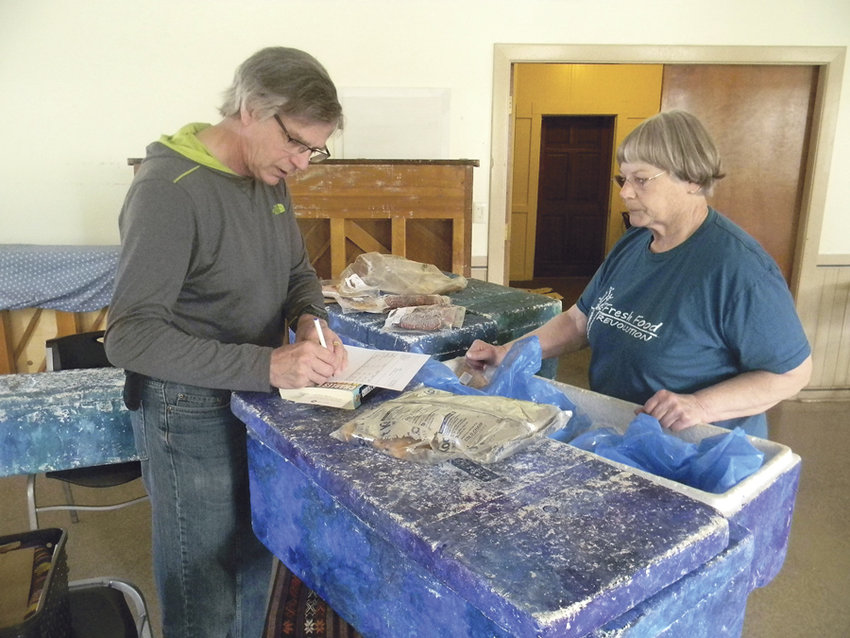 Rolf Torgerson and co-op board president Maxine Halley discuss an order for smoked salmon. Photo: Matthew Dean, KP News
Rolf Torgerson and co-op board president Maxine Halley discuss an order for smoked salmon. Photo: Matthew Dean, KP News
After a winter hiatus, the Fresh Food Revolution Cooperative (FFR) has resumed its operation on the Key Peninsula, distributing fresh produce to 100 local members.
“I don’t think there’s a co-op like us, and I don’t think you can get better, fresher food,” said FFR board member Ann-Marie Ugles.
FFR operates like a combination farmers market and membership grocery store. Co-op members contribute $60 and 12 hours of volunteer help per year and in return can order from a wide selection of locally sourced vegetables, fruit, meat and other food. Farmers from the Key Peninsula, Gig Harbor and Shelton fill the orders, with produce coming from as far away as Orting during slow local months. Customers and producers then meet Wednesday afternoons at the Key Peninsula Civic Center to trade cash and goods.
The co-op was formed about seven years ago by former members of a farmers market that was meeting in Key Center. “Some of the local producers and farmers still wanted to sell things, so they started the co-op,” said Junko Jacobsen, FFR’s distribution manager. The co-op founders wanted to create a model that would be more efficient for both producers and consumers.
FFR’s website allows members to order online, so producers know exactly how much food to bring before distribution day. “With the farmers market, they have to harvest whatever they have and expect to sell out at the market, which sometimes they don’t. We have an online system, so they don’t have to harvest what they don’t sell,” Jacobsen said. Meanwhile, customers can ensure that they get exactly what they want instead of browsing tables and booths.
For some, the perks of the co-op system go beyond time and efficiency. “It’s not a large market for me, but it’s real local,” said Rolf Torgerson, a Longbranch salmon fisherman who offers part of his catch to the co-op.
“We want to know where the produce is coming from and we want to know what the farmers actually look like,” said Jacobsen, who also praised the high quality of the local, fresh food.
A typical day’s offering at the co-op includes milk, eggs, beef, lamb, carrots, rhubarb and mushrooms, as well as more vegetables and meats. Other local products make their way to the co-op, too, such as sauerkraut, ice cream and homemade soap. “We have all these artisans that take all these products and make something else with them,” Ugles said.
Availability does change seasonally: Local small-scale food production is highest in the summer. “The local producers start to have more produce around the end of May or June and lasts till about September,” Jacobsen said. Some of the larger distributors like Terra Organics in Tacoma supplement the food supply in the winter and spring.
With its winter reorganization hiatus concluded, FFR is looking toward the future. “We want to grow producers, we want to find the small farmer out there that has a bunch of apples they want to make sure don’t rot,” Ugles said. “If you’re raising produce, I don’t think it’s a big stretch to get a business license.”
Potential producers require a business license and a review from the FFR team before they can sell at the co-op marketplace.
Many members of the co-op consider it not just a way to buy local food, but also a way to celebrate and support the farming community on the Key Peninsula. “It’s very important that we all know that once a farm is gone, it’s gone for good,” Ugles said. “The more we can support our farmers, the more that’s going to benefit our community in the long run.”
UNDERWRITTEN BY THE FUND FOR NONPROFIT NEWS (NEWSMATCH) AT THE MIAMI FOUNDATION, THE ANGEL GUILD, ADVERTISERS, DONORS AND PEOPLE WHO SUPPORT INDEPENDENT, NONPROFIT LOCAL NEWS